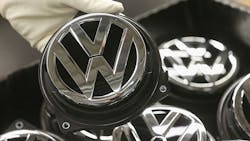VW Targets Carbon-Neutral Production for First Electric Car
Volkswagen AG plans to save 1 million tons of carbon-dioxide emissions a year by making production of its first electric model carbon neutral, part of an effort to clean up its image in the aftermath of the diesel-cheating scandal.
The German automaker will use green power to assemble the I.D. model at its plant in Zwickau and for the car’s battery cells, Volkswagen said Friday at an event in Dresden. Where renewable energy is unavailable, the company will invest in climate projects.
VW’s commitment is welcome news for Germany’s sputtering efforts to cut greenhouse gas emissions amid a reliance on coal-fired power and the steady growth in the number of combustion-powered vehicles on its roads. While energy sector emissions have declined since 1990, transport emissions have risen. Chancellor Angela Merkel aims to broker plans this year with car and truck makers to cut CO2 by around 40% by 2030.
After admitting in 2015 to rigging 11 million diesel vehicles to cheat on emissions tests, Volkswagen has pushed aggressively to develop electric vehicles. The VW brand alone will invest about 9 billion euros (US$10 billion) to roll out 20 electric models by 2025, putting pressure on the company to make the spending pay off.
To address concerns about charging, Volkswagen has set up Elli to offer customers green power to recharge their vehicles. The company is also part of the Ionity consortium that will install fast-charging stations at 400 locations on European highways.
“Climate change is the greatest challenge of our times,” Thomas Ulbrich, who oversees electric vehicles for the namesake VW brand, said in a statement. “Truly sustainable mobility is feasible if we all want it and we all work on it.”
By Chris Reiter and Brian Parkin
About the Author
Bloomberg
Licensed content from Bloomberg, copyright 2016.
